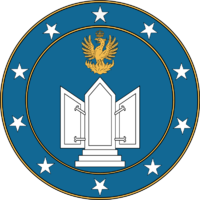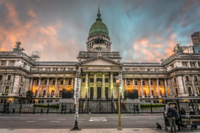Cortes Federales of Nouvelle Alexandrie
| Cortes Federales of Nouvelle Alexandrie Rimana Huñunakuy Wechua | |
| 8th Cortes Federales | |
 Seal of the Cortes Federales of Nouvelle Alexandrie | |
| Type | |
|---|---|
| Type |
Bicameral |
| Houses | |
| History | |
| Founded | 1693 AN |
| Preceded by | Federal Constituent Assembly (1685 AN-1693 AN) |
| Leadership | |
|
Lord Anglés, Marquess of Alpamayo, (Independent) since 1729 AN | |
| Structure | |
| Seats |
|
 | |
Federal Assembly political groups |
|
| Meeting place | |
The Cortes Federales is the bicameral legislature of the Federation of Nouvelle Alexandrie, consisting of the elected Federal Assembly (the lower house), and the unelected Chamber of Peers (the upper house). The Cortes Federales meets in the Legislative Palace in the city of Cárdenas, located within the Federal Capital District.
The Federal Assembly consists of 689 elected members that are chosen from each of the 12 Regions of Nouvelle Alexandrie through proportional representation. The Chamber of Peers consists of 122 appointed Peers. The Peers were previously exclusively members of the nobility of Nouvelle Alexandrie appointed by the King of Nouvelle Alexandrie on advice of the Premier until 1721 AN, when the Proclamation of Punta Santiago was amended to change the process, leading to the Royal Peer Selection Committee Act, 1721. After the 1721 AN reforms, new Peers are appointed by the 28-member Royal Peer Selection Committee from a public nomination process.
In accordance with the Proclamation of Punta Santiago, the two houses hold the supreme legislative power in Nouvelle Alexandrie. As such, they are the ones who vote on proposed legislature, scrutinize the Executive, and appoint and dismiss the Council of State. The Proclamation gives several important rights to Peers and Deputies: during sessions, they are inviolable from opinions; they are forbidden from any compulsory mandate; and they cannot be arrested except by order of the respective chamber. Under that same Proclamation, Political Parties are protected, unless the High Court reject or disband them.
History
Political Parties
Although the Representation of Deputies in the Federal Assembly is Proportional, there are currently Two Contemporary Large parties that dominate seats, and thereby politics, in Nouvelle Alexandrie.
Federal Humanist Party
Established in 1692 AN in Parap as a merger of the Wechu Nationalist and Humanist Club with Aldurian and Lyrican Federalist groups, the FHP is a big tent centre-right party with a right-wing element in its ranks. It describes itself as being Federalist, Humanist, Corporatist, and Constitutionalist. It also supported the Raspur Pact when it was formed, and takes a pro-stance on it. It won the first elections in 1693 AN under Augustus Strong. In 1698, it enlarged its lead to become the sole government party. It lost the 1703 AN elections to the SDLA, but regained a majority in the 1708 AN elections. The party has the most support under centrist and moderate right voters, especially under the upper class, rural communities, businessmen and entrepreneurs, as well as soldiers and religious people. Students, especially those of the Humanist Vanguard, also are a big voter base. Men also vote more FHP than women.
Federal Consensus Party
Formed as a successor to the Moderate Caucus. The party was started by three independent deputies in 1703 AN who proposed the Common Sense Principles. They became the third party after the 1708 AN elections. The FCP is a center party which calls itself Social Democrat, Centrist and Liberal, as well as Aldricist. It is known for supporting a market economy with government oversight, as well as promoting a rewriting of the Proclamation to include more Civil and Political Rights, and more powers to local and regional government. It also encompassed both radical centrist, progressive, and moderate wings. The party has support from the urban middle class, college students, liberals, and especially Wechua nationalists.
Democratic Socialist Party
Created from the Merger of the Solidary Party and the Progressive Party in 1698 AN, the SDLA took over as the second largest party from the Cambio Democrático in the elections of that year. The SDLA is a big tent centre-left party, meant to unite left-wing and centrists. It describes itself as an 'Alliance of Aldricists, liberals, social democrats, democratic socialists, market socialists, and trade unionists'. It is known for supporting a mixed social economy instead of a market economy or a planned economy. It encompasses both progressive, conservative, and moderate wings. It was the largest party after the 1703 AN elections, and remained in power until the next elections, when the FHP returned. The party has obvious support from left voters, including the labour union movement, as well as working people, the lower class, pensioners, and unemployed. Women also vote more SDLP than men.
Minor Parties
There are currently two minor parties that have representation in the Assembly:
- Wakara People's Party: the regional party of Boriquén, who focus on local issues and have a grassroots approach. The party is social-democratic, with a semi-nationalist tendency on culture and spirituality.
- United for Alvelo: founded by Pablo Alvelo Nieves, with a grassroots origin in Santander. The party is populist in nature, and considers itself left-wing, although deploying centrist policies as well.
Independents
The Proclamation permits politicians to be elected without a represented party. These are called Independents. There is no defining ideology, and most independents run for regional representation or one-issue politics.
Bodies of the Cortes
Presidium of the Assembly
Is the governing and representative body of the Assembly. It is composed of the Speaker of the Assembly, who chairs it, four Deputies Speakers and four Secretaries. They are all elected by the Assembly at the beginning of the legislature, using a system that favours their distribution among different parliamentary groups.
The Presidium is responsible for internal governance and the organisation of parliamentary work. Within the first aspect, it is responsible for drawing up the budget of the Cortes, directing and controlling its execution, ordering expenditure and various powers in the area of personnel. With regard to the organization of parliamentary work, it is responsible for programming the general lines of action of the Assembly, coordinating the work of its various bodies, the qualification of parliamentary papers and documents, the decision on their admissibility and the procedure for handling them, and other functions laid down in the Rules of Procedure.
Council of the House of Peers
The House of Peers has a similar governing and representative body as the Assembly. It is composed of the Lord President, who chairs it, four Deputies Lord Presidents and four Secretaries. They are all elected by the House at the beginning of the legislature, using a system that favours their distribution among different parliamentary groups. They have similar responsibilities as the Presidium.
Board of Party Spokespersons
Both chambers have a body through which the Parliamentary Groups participate in the organization of the work of the Chamber. It is made up of the Speaker of the Assembly, who acts as its Chairman, and the spokespersons of all the Parliamentary Groups, who have complete autonomy to appoint their representative. Its meetings are also attended by a representative of the Government, the members of the Presidium (at least one Deputy Speaker and one Secretary) and the Secretary-General. The main function of this body is to set the agenda of the plenary meetings. In addition, it must be consulted on various occasions, such as the preparation of the timetable and the order of business, the fixing of the number of members of the Committees, the establishment of certain types of these bodies or the order of business, among others. The resolutions of the Board of Spokespersons are adopted by weighted vote, which means that the vote of each spokesperson is equivalent to the number of members of the respective parliamentary group.
Permanent Body of Deputation
This is a special body that is responsible for the working of the Assembly when it is not in session. It fulfils a role of substitute of the Plenary of the Cortes so that certain and special functions are not left unattended when the Congress is in recess, has been dissolved or its mandate has expired. This is the case with the validation of the decree-laws issued by the Government, and with the information, authorization and declaration, as the case may be, of the states of alarm, exception and siege. It may also call for the holding of special sessions of the Cortes when it is not in session. Its members are distributed proportionally among the various parliamentary groups to reflect the composition of the House. Its President is the Speaker of the Assembly himself.
General Secretariat
The General Secretariat comprises the Cortes' administrative and technical services, performed by civil servants. They have a professional nature. Under the authority of the Presidium and of the Speaker, the General Secretariat is responsible for providing support to parliamentary bodies and Deputies for the performance of their duties. More specifically, it provides legal and technical advice to the said bodies, provides several services and organizes the necessary human and material means for the Chamber to hold sittings and conduct its functions. It is headed by the Secretary-General, appointed by the Presidium at the proposal of the Speaker from the Clerks of the Assembly with more than five years of actual services. Its basic units comprise, apart from the Secretary General, two Under-General Secretariats and the following Directorates:
- Department of Institutional Relations;
- Department of Communications and Press;
- Department of Legal Advice;
- Assembly Auditing Office;
- Department of Technical-Parliamentary Assistance;
- Department of Committees;
- Department of Studies, Analysis, and Publications;
- Department of the Library and Archives;
- Department of International Relations;
- Department of Appropriations and Procurement;
- Department of Human Resources and Internal Governance;
- Department of Infrastructure;
- Information and Communications Technologies Centre.
Committees
Permanent Legislative Committees
| Committee | Current # of Members | Term |
|---|---|---|
| Constitutional Affairs | 46 | 1706 AN-present |
| Foreign Affairs | 38 | 1708 AN-present |
| Justice | 38 | 1708 AN-present |
| Defence | 38 | 1708 AN-present |
| Economic Affairs, Business, and Commerce | 38 | 1708 AN-present |
| Budget and Finances | 42 | 1706 AN-present |
| The Interior | 38 | 1708 AN-present |
| Healthcare and Social Care | 38 | 1706 AN-present |
| Civil Works and Transport | 34 | 1708 AN-present |
| Housing, Rural Affairs, and Local Government | 34 | 1708 AN-present |
| Energy and Environment | 34 | 1708 AN-present |
| Education | 34 | 1708 AN-present |
| Labor, Social Security, and Pensions | 30 | 1708 AN-present |
| Industry, Trade and Tourism | 30 | 1708 AN-present |
| Human, Civil and Social Rights | 24 | 1708 AN-present |
| Agriculture, Fisheries and Food | 24 | 1708 AN-present |
| Science, Technology, and Innovation | 24 | 1708 AN-present |
| Culture and Sports | 24 | 1708 AN-present |
| Telecommunications and Media | 24 | 1706 AN-present |
| International Cooperation and Development | 18 | 1706 AN-present |
Permanent Non-Legislative Committees
| Committee | # of Members | Term |
|---|---|---|
| Rules and Regulations | 18 | 1706 AN-present |
| Petitions | 12 | 1706 AN-present |
| Appointments | 14 | 1706 AN-present |
| Democratic Quality, Anti-Corruption, and Institutional and Legal Reform | 18 | 1706 AN-present |
| Children and Adolescents' Rights | 8 | 1706 AN-present |
| Cortes Palace Affairs | 8 | 1706 AN-present |
| HM's Household | 6 | 1708 AN-present |
| Traffic & Road Safety | 8 | 1710 AN-present |
